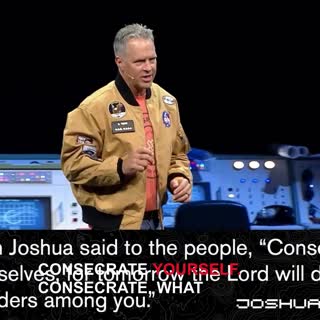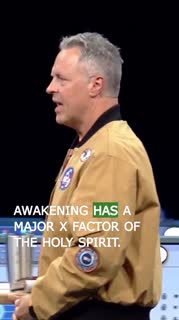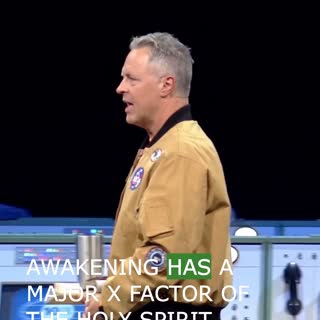Commitment and Sacrifice: Embracing God's Vision Together
Devotional
Sermon Summary
Bible Study Guide
Sermon Clips
"Commitment is not a positive word in our culture. We don't like to commit. We don't like to commit to even dating somebody, let alone marrying somebody. We don't like to commit to weekend plans unless we have something that is so sold out we've got to get there a year in advance. Everyone wants to be there or something like that. We just don't like to commit. What does it mean to commit? I want to give you another C word that's very similar to. It's the word consecrate." [00:09:52] (24 seconds)
"Consecrate yourself. Consecrate. What does it mean to consecrate yourself? It means if I'm here where everybody else is, I set myself aside. If I'm here where everybody else is, I allow myself to be used by God. If I'm here, I dedicate and set myself aside for God's purposes in a moment, which in this situation was stepping into the Jordan River." [00:10:17] (24 seconds)
"Awakening has a major X factor of the Holy Spirit. And Jesus says the Holy Spirit is like wind. He's unpredictable. You don't know exactly what He's going to do. But I can tell you this. The Spirit is looking to see, is there any community out there that will give up something for my vision? Is there any people out there that will sacrifice? Can you sacrifice something? There's not a lot today." [00:24:07] (26 seconds)
"God's testing us right now. I don't know if you know that. It's a test. That, that was, that conversation was a test for me, a test, like, do you want to just do like a growing nonprofit and do nonprofit plays that they do? Or do you have a different thing you want me to do through this church? It was a test, I think, and it's a test right here for you right now." [00:35:43] (22 seconds)
"For a lot of us today, this is a test. First of all, you already started passing the test. You came in today. You didn't stay home. That's awesome. That's awesome. And now, and now, you get to see whether or not God has your heart. God gets to see whether or not he has your heart. And the way he sees that is sacrifice." [00:39:35] (20 seconds)
"God, if there's something you want from us, if you want to nudge us right now, we'll take that. If not, we want you to hear from us. We want you to hear how much we care for you and the vision for your kingdom." [00:44:54] (20 seconds)
Ask a question about this sermon
"Consecrate yourself. Consecrate. What does it mean to consecrate yourself? It means if I'm here where everybody else is, I set myself aside. If I'm here where everybody else is, I allow myself to be used by God. If I'm here, I dedicate and set myself aside for God's purposes in a moment, which in this situation was stepping into the Jordan River." [00:10:17] (24 seconds)
"Awakening has a major X factor of the Holy Spirit. And Jesus says the Holy Spirit is like wind. He's unpredictable. You don't know exactly what He's going to do. But I can tell you this. The Spirit is looking to see, is there any community out there that will give up something for my vision? Is there any people out there that will sacrifice? Can you sacrifice something? There's not a lot today." [00:24:07] (26 seconds)
"God's testing us right now. I don't know if you know that. It's a test. That, that was, that conversation was a test for me, a test, like, do you want to just do like a growing nonprofit and do nonprofit plays that they do? Or do you have a different thing you want me to do through this church? It was a test, I think, and it's a test right here for you right now." [00:35:43] (22 seconds)
"For a lot of us today, this is a test. First of all, you already started passing the test. You came in today. You didn't stay home. That's awesome. That's awesome. And now, and now, you get to see whether or not God has your heart. God gets to see whether or not he has your heart. And the way he sees that is sacrifice." [00:39:35] (20 seconds)
"God, if there's something you want from us, if you want to nudge us right now, we'll take that. If not, we want you to hear from us. We want you to hear how much we care for you and the vision for your kingdom." [00:44:54] (20 seconds)












